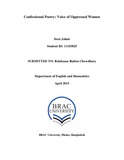| dc.contributor.advisor | Chowdhury, Rukhsana Rahim | |
| dc.contributor.author | Jahan, Israt | |
| dc.date.accessioned | 2015-09-01T09:12:35Z | |
| dc.date.available | 2015-09-01T09:12:35Z | |
| dc.date.copyright | 2015 | |
| dc.date.issued | 2015-04 | |
| dc.identifier.other | ID 11103025 | |
| dc.identifier.uri | http://hdl.handle.net/10361/4342 | |
| dc.description | This thesis is submitted in partial fulfillment of the requirements for the degree of Bachelor of Arts in English, 2015. | en_US |
| dc.description | Cataloged from PDF version of thesis. | |
| dc.description | Includes bibliographical references (page 33-36). | |
| dc.description.abstract | Confessional poetry is the poetry of the personal. This genre is mainly focused on extreme moments of individuals, their private experience and psyche. Confessional poets‘ private experiences are revealed in their poetry. Confessional poetry is quite different from traditional poems. This genre breaks down the traditional definition of poetry and explores new poetic style where poets vent out their inner feelings and unspoken words through their writings. Confessional poetry is famous both for male and female poet but female poets theme; writing and style are different from male poets. For the female poets, confessional poetry is a medium where they can expose their psyche. Through this genre woman poets seek self-definition. Female confessional poets struggle to find connection between the name that was set for her by the society and the name that they wants to give themselves. Sylvia Plath and Kamala Das are two confessional poets belong to different country. Plath is an American confessional poet and Kamala Das is Indian poet. Though these two poets belong to different country, different society even their themes of poems are quite different but the tone of their poems is same. Their personal trauma, childhood suppression is vented out by their poetry. Both mental and physical sufferings can be seen in Sylvia Plath and Kamala Das‘s poems. Plath‘s poetry book The Ariel deals with her suffering for being a woman, this book also deals with mental sickness, the urge to find the ―Self‖of Plath. Then, Kamala Das‘s book The Descendants is more about her experience of love and lust. Many poems of this book are about her search for true love. Just like Sylvia Plath Kamala Das also portrays her sufferings for being a woman and her struggle to find self-definition. Actually, by showing personal sufferings in their poems, these two poets depict the universal sufferings of womanhood. This two women‘s struggle is to find their identity and their ―Self‖. Actually these two poets use this genre as a medium for their oppressed voice in a rebellious way. They project their emotion as well as represent the reality of the world through portraying their own experience. | en_US |
| dc.description.statementofresponsibility | Israt Jahan | |
| dc.format.extent | 36 pages | |
| dc.language.iso | en | en_US |
| dc.publisher | BRAC University | en_US |
| dc.rights | BRAC University thesis are protected by copyright. They may be viewed from this source for any purpose, but reproduction or distribution in any format is prohibited without written permission. | |
| dc.subject | English and humanities | en_US |
| dc.subject | Oppressed women | en_US |
| dc.subject | Confessional poetry | en_US |
| dc.title | Confessional poetry : voice of oppressed women | en_US |
| dc.type | Thesis | en_US |
| dc.contributor.department | Department of English and Humanities, BRAC University | |
| dc.description.degree | B.A. in English | |

